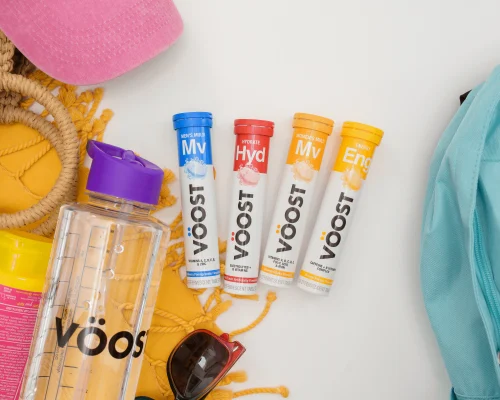Unlike most of the other letter-named vitamins, Vitamin B is not so simple. From Vitamin B1 to B12 (with a few missing in between), there’s a lot of B vitamins to keep track of, all supporting many healthy body functions. Keep reading to learn more about B-Complex Vitamins. And while they sound, well, complex—know that VÖOST is here to BÖOST your B-Complex Vitamins and daily vitamin intake with fun, effizing effervescents.
What are B-Complex Vitamins?
B-Complex Vitamins are a group of eight vitamins, often referred to collectively as Vitamin B Complex or B-Complex Vitamins. Like a family, B-Complex Vitamins share some important fundamental characteristics and like a family, each B-Complex Vitamin has certain unique and specialized properties and functions. The members of the B- Complex Vitamin family include¹:
B1 – Thiamin/Thiamine
B2 – Riboflavin
B3 – Niacin
B5 – Pantothenic acid
B6 – Pyridoxine
B7 – Biotin
B9 – Folate/Folic Acid
B12 – Cobalamin
All B-Complex Vitamins are water-soluble. This means that unlike their fat-soluble cousins A, D, E, and K, they aren’t stored in the body and need to be replenished through the foods we eat and/or supplements we take.² ³
Were you wondering about vitamins B4, B8, B10, and B11? Good question! Vitamins are substances that our bodies need to develop and function normally.⁴ Although they were originally designated as vitamins. we now know “Vitamins” B4, B8, B10, and B11 are not required for normal human growth and function. Thus, they are no longer considered Vitamins and are not considered part of the B-complex vitamin family.
How Much B-Complex Vitamins You Need Daily
Your body requires different amounts of each B vitamin. The daily values of each B vitamin are as follows⁵:
B1 (Thiamin): 1.2 mg
B2 (Riboflavin): 1.3 mg
B3 (Niacin): 16 mg NE
B5 (Pantothenic acid): 5 mg
B6 (Pyridoxine): 1.7 mg
B7 (Biotin): 30 mcg
B9 (Folate): 400 mcg DFE
B12 (Cobalamin): 2.4 mcg
VÖOST Supplements with B-Vitamin Complex
The wide array of vitamin supplements, on top of the dizzying varieties of B-Complex Vitamins, can make choosing a supplement seem overwhelming. Don’t worry – VÖOST is here to help! You can VÖOST your vitamin intake with one of the many effizing, amazing effervescents that have B-Complex Vitamins.
VÖOST Women’s and Men’s Multi-Vitamins are packed with the vitamins, minerals, and nutrients women and men need to support daily health.* VÖOST Multivitamins have you covered with all the B-complex vitamins. VÖOST Energy has the perfect amount of Caffeine to give you a healthy energy boost* and the full array of B-complex Vitamins.
VÖOST Hydration gives you Electrolytes to promote healthy and delicious hydration + B-complex Vitamins.* Each VÖOST also packs its own fruitastic flavor, which will have you looking forward to taking your vitamins every day!
How to Get More B-Complex Vitamins in Your Diet
Supplements aren’t the only way to get the B-Complex Vitamins in your diet. Many of the B-Complex Vitamins are in foods we eat daily. If you’re intentionally eating healthy, fresh foods, then you’re probably getting a good number of B-Complex Vitamins in your diet. Keep reading for foods with plenty of B-Complex Vitamins⁶:
1. Salmon
Head to the sea for a hearty portion of Vitamin B! In addition to being famously high in omega-3 fatty acids, salmon provides a wealth of B-Complex Vitamins. A 3.5-ounce serving of wild-caught Atlantic salmon provides impressive amounts of B1, B2, B3, B5, B6 and B9. Plus, it has over 100% of the daily recommended value of B12.
2. Avocado
Avocado is more than a toast trend! With an abundance of B vitamins, avocadoes earn their popularity as a breakfast staple on toast, or as savory snack when prepared as guacamole. One whole avocado gets Vitamin B1, B2, B3, B5, B6 and B9 into your diet.⁷
3. Egg
Order up! Hard boiled, poached, sunny side up, or scrambled, eggs are known for a fantastic nutritional profile. Plus, they’re an egg-cellent source of the B-Complex Vitamins. One large egg provides about 20% of the daily recommended value for B2 and B12, and about 9% of the daily value for B9.
4. Spinach
All leafy green vegetables are great go-to sources for B-Complex Vitamins. Spinach stands out, with 1 cup cooked spinach providing B1, B2, B3, B5, B6 and B9. Throw some spinach into your foods for a B-Complex Vitamins Boost!
5. Chicken
Lean, versatile, and tender – eating chicken not only adds protein to your diet, but it also adds some of the B-Complex Vitamins we need. A 3.5-ounce portion of skinless, boneless chicken breast provides B1, B2, B3, B5, B6, and B12. Notably, it includes over 60% of the daily recommended value of B3, and about 70% of the daily recommended value for B6.
